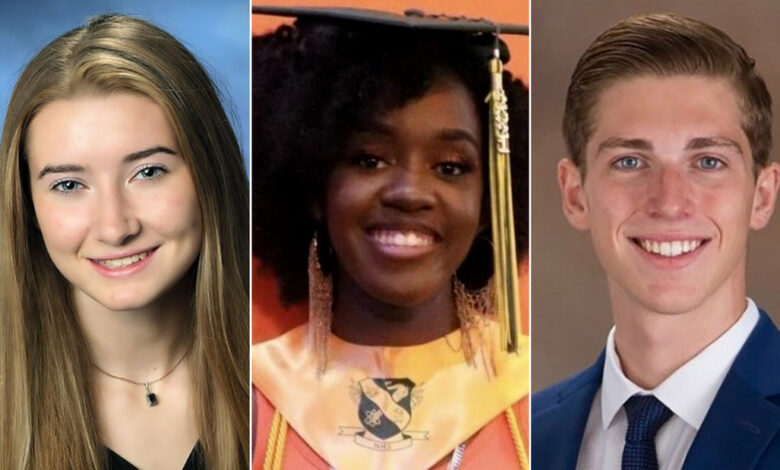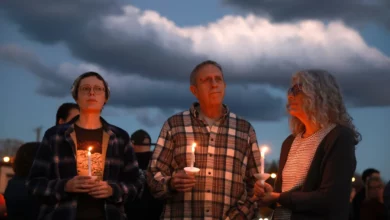
A generation of kids who grew up haunted by the fear of school massacres can’t outgrow their trauma: It’s also stalking their carefree college days.
America’s latest mass shooting, until the inevitable next one, wrote a new community in the roll call of colleges stigmatized by tragedy. To Virginia Tech, Northern Illinois and the University of Virginia, add Michigan State University.
Footage showed students fleeing for their lives. Tales emerged of individuals smashing windows to save classmates from a gunman. Students blockaded themselves in dorms, built barricades in the library, cowered in restrooms, or just ran for their lives after their cellphones buzzed with a “shots fired” warning from the university police force.
More horror, in yet another city, in the cycle of sudden death that can strike anyone, anywhere. With macabre irony, the shootings at Michigan State on Monday night, which killed three students and injured five more, took place on the eve of the fifth anniversary of the massacre at Marjory Stoneman Douglas High School in Parkland, Florida, on Valentine’s Day 2018. Tuesday was also the 15th anniversary of a mass shooting that left five students dead at Northern Illinois University.
The day brought the familiar futile anger over the tortured politics of gun control and splits among Americans about firearms that mean that – even after more senseless deaths – nothing will be done.
Any mass shooting is horrific. But whenever young lives are cut off before they’ve barely begun, the tragedy is especially aching.
Everyone is ‘terrified’
Parents who send their kids off to college fret about whether their sons or daughters will fit in, will struggle with academics, could stumble because of alcohol or drugs. Now, they must also worry about mass shootings. Can a nation that can’t guarantee its kids are safe at school now not keep them safe at college?
“They are terrified, their parents are terrified,” Michigan Democratic Rep. Elissa Slotkin told CNN on Tuesday after meeting survivors and family members from Michigan State, which is in her district. “It’s terrorizing and we either do something about something that is terrorizing our population, or we don’t care about it.”
Michigan Attorney General Dana Nessel told CNN that when she dropped her kids off at Michigan State a year-and-a-half ago she thought, “It is going to be a miracle if we get these kids through four years of college without some sort of an incident like this taking place, because they happen so frequently.”
“And unfortunately, as it turned out, the answer is no,” Nessel said. “We couldn’t get our kids through college without subjecting them to a mass shooting at their school.”
Mercifully, most American students will and do make it through college without such a terrible experience. But that doesn’t mean they will evade the fear such a shooting creates. Many know the panic stoked by false alerts about active shooters or a just the general question over whether their campus is safe.
Monday’s killings led to a heartbreaking only-in-America moment, when a young Parkland survivor counseled stricken Michigan State Spartans on how to process their nightmare and what they would experience in the years ahead.
“Five years ago, I almost lost my life in school. And yesterday more young people lost their lives to this issue of gun violence in college,” Aalayah Eastmond told CNN’s Victor Blackwell on Tuesday. “I’m so sad that so many other communities are dealing with this issue every single day.”
A generation that came of age amid school violence
Today’s college kids are no strangers to the pang of fear over gun violence.
Studies show school shootings are getting more frequent and exposing more kids to such horrors, and millions more to the nagging feeling that it could happen to them.
Each kid is now familiar with active shooter drills. Every parent knows the lurking anxiety that the worse could happen one day when they drop their child off at class. One of the only mercies of Covid-19 school shutdowns was that fear went away for a while.
A previous generation of students was marked by the Columbine High School shooting in Littleton, Colorado, in 1999 that killed 12 students and a teacher, and the Virginia Tech massacre in which 32 people died in 2007.
Today’s college undergrads grew up under the shadow of the massacre of 20 6- and 7-year-olds and six adults at Sandy Hook Elementary School in 2012, an outrage that shocked the nation but failed to unlock the stuck politics of gun reform. In a horrible and extreme example of how gun violence is a constant companion for today’s young people, some Michigan State University students who survived Monday’s mass shooting had also escaped with their lives from a November 30, 2021, shooting at Oxford High School, about an 80-mile drive east of the MSU campus in East Lansing.
“I never expected in my lifetime to have to experience two school shootings,” Andrea Ferguson, whose daughter is now at MSU, told CNN affiliate WDIV.
Remembrances of Monday’s dead are beginning to emerge.
Alexandria Verner, one of three students who died, was remembered by her Clawson Public Schools Superintendent Billy Shellenbarger as “everything you’d want your daughter or friend to be.” The two other students killed were Arielle Anderson and Brian Fraser who both graduated in 2021 from high schools in Grosse Point, Michigan.
“How is it possible that this happened in the first place, an act of senseless violence that has no place in our society and in particular no place in school,” asked Jon Dean, superintendent of Grosse Pointe Public Schools. “It touched our community not once, but twice.”
Empty Washington rituals
Such is the inertia surrounding gun politics in Washington, that it’s become a cliche in itself to write that the usual rituals of regret and condolences played out in the capital after a mass shooting but without any expectation that politicians would respond with meaningful measures to stop it happening again.
President Joe Biden and a bipartisan group of senators did pass the most significant gun safety law in decades last year, though it failed to ban any weapons and fell well short of what the White House, gun control advocates and most Americans want to see. Future gun control legislation is unthinkable with Republicans now holding a narrow House majority.
Firearms reform activists will hope that the Democratic sweep of the governorship and both chambers of the state legislature in Michigan will open the possibility of significant changes to the law – but gun politics remain treacherous for lawmakers in swing states who want to cling onto power.
Biden, speaking at a conference of county executives in Washington, issued one of his increasingly frequent condemnations of mass shootings, bemoaning “a family’s worst nightmare that’s happening far too often in this country.”
“We have to do something to stop gun violence ripping apart our communities,” he said, and renewed his call for an assault weapon ban that everyone knows had no chance of passing even in a Democratic-run Congress.
Arguments against gun control are as well rehearsed as those for it. Second Amendment absolutists often say the answer is more guns on the streets to allow people to defend themselves and to “harden” institutions like schools and universities. Many point out that often, shootings are perpetrated by gunmen with troubled mental histories or who become isolated or alienated from their society.
But there is rarely any concentrated effort from Republicans in Washington to spend the vast amounts of money needed to overhaul mental health services. In the states, Republican governors and legislatures are busily loosening already lax guns laws in a way that are likely to lead to even easier access to weapons.
Given the paralysis of gun politics, maybe it’s on individuals to act. Several recent cases of mass shootings have appeared to have a common factor: the disturbed mental state of an eventual perpetrator who had access to guns.
While police are still searching for a motive for the Michigan State gunman’s rampage, his father, Michael McRae, said that after his mother died several years ago, he became “more and more bitter … angry and bitter … evil angry.” The gunman’s sister told CNN her brother was socially isolated and a criminal history with weapons. Police said he “had a history of mental health issues.”
Despite the deadlocked debates over guns rights and gun control, more pro-active action by loved ones and others might allow some red flag laws that could see weapons taken from the mentally ill to work. Katherine Schweit, a former FBI senior official and active shooter expert, said people who see relatives deteriorating mentally need to act.
“We have to follow through, we have to report stuff,” she told CNN’s Jake Tapper. “It’s the ‘see something, say something’ that has prevented us having the terrorist events in the United States. We need to do the same thing for these types of situations.”
This could save lives in the future. But it’s too late for three Michigan State students who will never graduate, or their fellow Spartans whose college years are now stained by the plague of gun violence.




